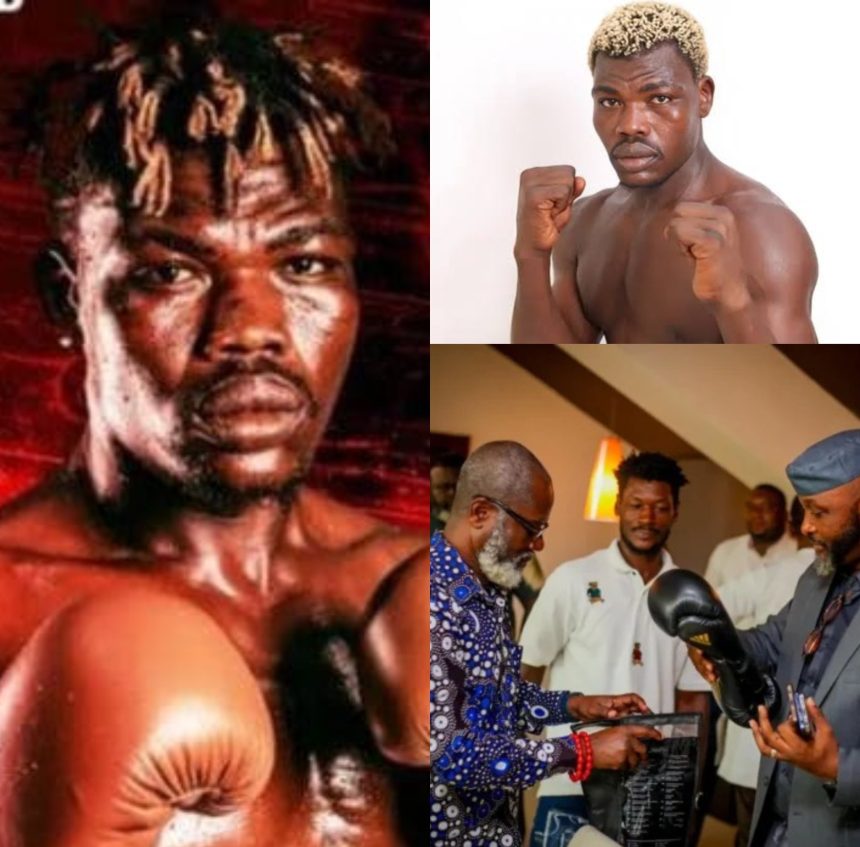Ghana’s boxing fraternity has been plunged into mourning and uncertainty after the National Sports Authority (NSA) announced an indefinite suspension of all boxing events in the country. The decision follows the tragic death of promising Ghanaian boxer Ernest Akushey, widely known to fans by his ring name “Bahubali.”
The 24-year-old fighter passed away in the early hours of Tuesday, September 17, just days after his September 12 bout against Jacob Dickson at the Bukom Boxing Arena in Accra. The fight was stopped by the referee after Bahubali failed to recover from sustained blows, and he was later rushed for medical attention. Doctors subsequently confirmed that the boxer had suffered internal bleeding, a diagnosis that ultimately led to his untimely passing.
In a statement released shortly after the news broke, the NSA emphasized that the decision to halt all boxing activities was taken in collaboration with the Ministry of Sports and Recreation. The suspension, the Authority said, is aimed at prioritizing athlete safety, health, and welfare, while allowing time for a comprehensive review of safety protocols in Ghana’s boxing scene.
“This reflects our joint commitment with the Sports Ministry to protect the safety, health, and welfare of athletes,” the NSA’s statement read. “Investigations into the tragedy are already underway, and until their conclusion, all boxing promoters, coaches, athletes, and supporters are to comply fully with this directive.”
The tragic death of Bahubali comes just months after the loss of another Ghanaian boxer, Gabriel Aluwasegun, who collapsed and later died in April 2024 following injuries sustained during a bout. The two incidents have reignited heated debates over the adequacy of medical preparedness, ringside safety measures, and regulatory oversight in Ghana’s boxing industry.
The suspensions also cast a shadow over Ghana’s proud boxing tradition. The West African nation has produced global icons like Azumah Nelson, Ike Quartey, and Joseph Agbeko, with boxing long regarded as one of Ghana’s most successful sports on the world stage. However, the back-to-back tragedies have exposed critical gaps in modern-day athlete welfare, leaving fans and stakeholders demanding reforms.
Stakeholders in the sport are already calling for urgent interventions. Concerns have been raised about whether Ghana’s boxing events are adequately equipped with emergency medical services, trained personnel, and post-fight care for athletes. The NSA has promised a thorough review, which is expected to cover everything from medical screenings of fighters to insurance policies, referee interventions, and the readiness of ringside doctors.
Analysts argue that without reforms, the suspension risks becoming more than just a temporary measure, potentially threatening the careers of young boxers and the livelihood of promoters, coaches, and other industry players. Yet many agree that the immediate priority must be to safeguard human life.
As investigations into Bahubali’s death continue, the Ghana Boxing Authority (GBA), medical practitioners, and sports safety experts are expected to collaborate with the NSA to recommend stronger safeguards before the sport is allowed to resume. While fans await clarity, the suspension underscores the delicate balance between maintaining Ghana’s boxing legacy and ensuring that athletes are never again put at unnecessary risk.
For now, the echo of Bahubali’s name serves as a somber reminder that behind the glamour and glory of boxing lies a dangerous reality — one that Ghana’s sports authorities can no longer afford to overlook.







